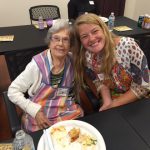At Atlas Senior Living, our communities pride themselves on finding activities that will fuel the souls of our residents. Our independent living, assisted living and memory care communities all have a wide variety of activities that allow our residents to find joy in each day.
While each of these areas in senior housing brings their own challenges and rewards, a great focus in the memory care area has been the need and importance of daily activities.
With an increased number of individuals becoming diagnosed with Alzheimer’s disease or other forms of dementia, it is difficult to find a person who has not in some way been affected by dementia.
The Facts About Alzheimer’s and Other Dementias
According to the Alzheimer’s Association’s facts and figures guide, “more than 16 million Americans provide unpaid care for people with Alzheimer’s or other dementias.” In response to this staggering statistic, it is imperative that we arm ourselves with knowledge, strategies and new ideas to give those with dementia the best quality of life possible.
Due to the differing personalities of individuals, as well as the various stages of dementia, it is important to find ways to engage each person differently. What works for one person will not necessarily work for someone else, and the sooner this truth is realized the less stress and heartache it will cause.
We must stop comparing the skills of one person to another and respect the individual needs of each loved one. It is through these efforts that we can meet residents where they are and walk their journey with them.
Atlas’ SPIRIT Program
The foundation of our activity planning and something that anyone caring for a loved one with dementia can put into practice is our SPIRIT programming. SPIRIT is an acronym for Strength, Purpose, Identity, Rediscover, Invigorate and Tailor.
Focusing our programming around these six key pillars allows us to make sure that we are giving each resident the individual attention and respect that they deserve.
Use the SPIRIT Pillars
- STRENGTH
Focus on the individual strengths of your loved one. Search for enjoyable hobbies, find a way to use already existing talents, or look for people with similar strengths who may want to spend time and invest in your loved one.
- PURPOSE
Provide purpose for each day. Ask your loved one for help with activities that help them to feel useful. These may be tasks that you do not need help with or even could do faster on your own. Giving your loved one a sense of accomplishment and pride as well as providing a positive way to fill their time is key. Some examples are asking for help matching socks, filling bird feeders, arranging flowers, folding towels or setting the table. Just make sure that whatever you choose is a task your loved one is excited about, not a dreaded chore.
- IDENTITY
Celebrate each person’s identity. Relive memories of trips, family members or discuss other key life memories with your loved one. It is important to note that people with dementia generally have poor short-term memory but better long-term memory for much of the disease. Do not stress if names, places or other details are forgotten. Another way to focus on identity is to find activities that may be pertinent to a past career or hobby; possibly writing in a grade book, organizing a drawer or workspace, filing papers or fitting and adjusting PVC pipes from the local hardware store.
- REDISCOVER
Rediscover the joys of the smallest successes. Encourage your loved one for accomplishments big and small. Say thank you for the tasks that you have asked to be completed and show your genuine gratitude for their assistance.
- INVIGORATE
Invigorate each other daily. There are numerous ways to stimulate the senses. Music is a wonderful way to reach beautiful memories, get people up and moving and have fun together. We encourage music to be used for as long as it is being enjoyed, even if it is solely background noise.
An additional way to invigorate the senses is through aromas. When using oils, incenses, the smell of favorite treats baking, or fresh popcorn, treasured memories may be reached.
Another key for invigoration is daily exercise. Exercise is, of course, important for all of us, but for those with dementia, it can also lessen wandering throughout the day and night, help with sleep and assist with balance and coordination.
- TAILOR
Tailor programming for each person. Use your personal knowledge of your loved one to determine what activities may be most enjoyable. Something that works one day may not be a favorite the next day and something that was not enjoyed recently may be a pleasurable activity again so don’t be afraid to keep it fresh and retry activities if they do not create an adverse reaction. Individuals who are further advanced in their dementia may not enjoy activities they once did but will typically enjoy tactile activities and music. For these individuals, try providing a therapy animal, fabrics with various textures, a fidget blanket, stuffed animal, or household items with differing surfaces.
These six attributes have proven effective with our residents and have assisted our memory care associates to better connect with residents and build stronger relationships of trust and understanding.
Find what works best for you and your loved one. It is important that those with Alzheimer’s or dementia stay busy and keep their mind and body active. As difficult as some days may be, it is imperative that as trusted caregivers and loved ones we remain patient and flexible and take breaks when necessary.
We hope that trying these strategies with your loved one while caregiving or visiting will help build stronger relationships and deepen understanding.

Kelly Adriano
Lifestyle Director at Madison Heights Evans
Experience the Atlas difference today. Find a nearby community, call 877.402.8527 or contact us online for more information.






